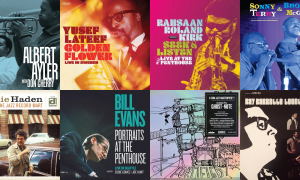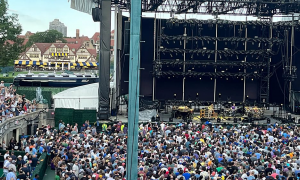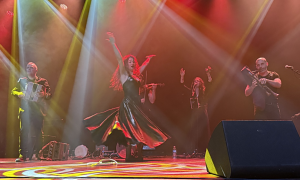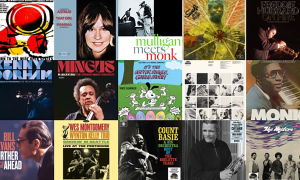Home » Jazz Articles » Journey into Jazz » Pleasures of Re-learning The Ropes
Pleasures of Re-learning The Ropes
To paraphrase good ole Mark Twain, free jazz [like people] should be taken in small [but regular] doses.
There could also be no other more effective method of putting off a newbie permanently than exposing him or her to the aggressive assault by a free jazz exponent, worse still, by a totally arrhythmic atonal orgiastic outpourings of over-excited emotional excesses from an expressive saxophonist or a trumpeter, either. To paraphrase good ole Mark Twain, free jazz [like people] should be taken in small [but regular] doses.
At the same time we cannot forget that once the seemingly overwhelming anarchy of sound is slightly more familiar, even the greenest amongst the greenhorns begins to like a certain piece, in certain parts. Well, the first rung of the ladder has been crossed... It goes without saying then, that a judicious choice in making the selections for the newbie should be of paramount importance.
That’s precisely what my good friend Scott Dolan of Florida [now Missouri ] has done. An excellent job in this direction by burning a couple of CDs for me, which I can wholeheartedly tout as one of the best introductions ever to free jazz and ‘straight-ahead’ jazz. It was my good fortune to get into an argument with him over this topic earlier last year when my column was just two installments old : the exchange of ideas and arguments was fast and furious, much like the music that gushes lustily from some of the wonderful selections Scott has made for my listening pleasure.
It begins with "Music Matador" by Eric Dolphy, playing his magical bass clarinet with a gay abandon. The tune is catchy, the musical arrangement is quite stimulating and the use of minimum instrumentation makes it doubly attractive –one could even say, it makes the tune easily digestible. I wish to dwell on this particular tune and air my views, which Scott usually finds interesting...
First of all, the tune "Music Matador" showcases the brilliant genius of Eric Dolphy as a composer [ frankly this is one aspect I never paid serious attention to : this is precisely what I call re-learning the ropes... great fun... ] and Scott is right when he says it’s difficult to imagine what heights this genius might have reached as a composer too... it’s also impossible to understand why many record companies turned this gifted genius down whenever he approached them with this particularly astounding piece. But then, the Beatles were turned down sharply too. Probably making cocky gaffes comes naturally to recording moguls and their decision-making lackeys.
On the first listen, "Music Matador" with its rather unusual almost Bossa Nova-ish rhythm, stands out. It may even sound like a Latin dance number, if played in the background, with your mind busy elsewhere. However, on a careful and focused aural scrutiny, it magnanimously throws open up virtual treasures of most amazing sounds-bytes. Dolphy’s bass clarinet seems subdued throughout, and a zebra-strip like sound-collage emerges wherein the brighter strips are Sonny Simmons’ rather petulant solos and his screaming interludes now and then. The dark stripes are Dolphy’s self-indulgent but deeply engaging solos.
Prince Lasha [could someone please tell me more about him?] on the flute, gives off truly dazzling flashes of genius and the bassist Richard Davis, highlights his own undisputable mastery over this wonderful instrument amply. Clifford Jones on soprano sax remains a step stylishly behind Simmons, appears happy to be led and so is the impish trumpeter Woody Shaw. All told, a dizzying masterpiece indeed, from the album ‘Conversations’. I would most certainly like to listen to this album, Scott, thanks a lot indeed.
Scott has often laid heaps of praise on a pianist, Eric Reed, whom he considers a gifted genius, and who has shown off his cool skill on a number of tunes here... and it is difficult to disagree about his exalted talent. Well my old time favorites Wynton Kelly and McCoy Tyner are there, too : but Reed somehow has a haunting quality to his playing [ which I had noticed first in Kelly of course, several decades ago when the jazz world was young... to some extent Ramsey Lewis and even Horace Silver had developed this haunting quality to their piano playing]. Even Ahmad Jamal had it, and Oscar Peterson developed it too. It’s a charming attribute, this quality.
The selection "Calling The Indians Out" is yet another brilliant [but straight-ahead jazz] number wherein Eric Reed has performed creditably well though juxtaposed with a host of other dazzling talents. The redoubtable Wynton Marsalis on the trumpet, Wes Anderson on alto sax, James Carter on bass clarinet [ah, Dolphy wasn’t the only one, I get the point, Scott], and ten others –most of whom seem new names to me. However the ensemble performs as a turbo-charged orchestra with shades of Stan Kenton even Lalo Schiffrin or André Previn in some patches. The overall effect tends to be more on the western classical type orchestral arrangement but then the individual players are jazzmen first, so at the first opportunity they get, their true colors come shining out as brilliantly as white ducks emerging from a muddy river bank.
"Ghosts" by Albert Ayler is a favorite tune of mine, by now, Scott. Some months ago, I had heard Ayler for the first time with full attention to his music and was rather struck by his Sonny Rollins kind of rasping, almost abrasive sound, his awesome energy and his true ‘free’ jazz spirit. It is difficult to sit still and listen to Ayler, just as it is difficult to sit and watch Rollins dance up and down the stage, as restless as if he had ants in his pants. It shows in his music too. ‘Ghosts’ has been judiciously chosen by Scott, from an album he likes to call the Bible of Free Jazz. The album is ‘Spiritual Unity’ –and I would love to hear the rest, I am sure. This piece is frightfully original, audaciously impudent in making a raw impact on the unsuspecting listener and it has that ‘timelessness’ factor associated with it –which I have discussed earlier. A most wonderful composition and performance, indeed.
"Sister Cheryl" is the next coup de grace from Scott, and I must say the piece emerges from oblivion slowly but with an awesome beauty of some new galaxy emerging from the dark background of a far away cluster of stars... And yes, Herbie Hancock has given us a soulful performance here, whilst Wynton Marsalis clinks and clanks and toots his way through the solo, to borrow a colorful description from Scott. But it does not diminish in any way the musicianship or the brilliant improvisational scope straddled by Marsalis, I am sure. He definitely does not sound unsure to me –making rather forceful statements and popping up from the slabs of silence which punctuate the number artistically in many places. Branford Marsalis on the soprano sax gives a goodish account of his talents here. An incredibly good number, Scott. Good choice!
Any discourse on free jazz would be incomplete without mentioning that cool cat Charles Mingus, and Scott has rather shrewdly included his "Wednesday Night Prayer Meeting" from the album Mingus At the Antibes. The hero of the piece seems to be Ted Curson on trumpet, equally met with gusto by Eric Dolphy on alto sax and Booker Ervin on tenor sax. Half way through the number Dolphy takes center-stage and virtually pours his soul out through his horn... Man, what a behemoth of a solo, what a mind-boggling heart-thumping solo... you’re right, Scott this must be Eric Dolphy’s best solo ever. Can’t think of anything better. However an additional dimension is lent to it by the all those cats screaming in unison behind him –reminding me of the crazy cat-fights sort of performances by ‘four brothers’ of the Swing Era. Here the difference is, the overall voltage is high –the atmosphere is virtually electric [I love that clapping session wherein the drums elegantly slither away to the background] and the sense of anticipation makes you break out in goose-pimples all over... as if something earth-shaking is about to happen, and every pore in your skin turns into an individual ear, sore with sheer anticipation. A great path-breaking number, Scott.
Well I should be rounding off for now. Thanks a lot, Scott my pal, for having taken so much trouble, especially for penning down the credits so meticulously and also for your deliciously pungent comments. I am overwhelmed, I must admit, buddy. I am going to cover the other "Bonus CD" you sent me in my next column, to continue in the same vein.
Till then friends [do write to me, I like that: both bouquets and brick-bats are welcome ] cheerio and so long...
Tags
PREVIOUS / NEXT
Support All About Jazz
 All About Jazz has been a pillar of jazz since 1995, championing it as an art form and, more importantly, supporting the musicians who make it. Our enduring commitment has made "AAJ" one of the most culturally important websites of its kind, read by hundreds of thousands of fans, musicians and industry figures every month.
All About Jazz has been a pillar of jazz since 1995, championing it as an art form and, more importantly, supporting the musicians who make it. Our enduring commitment has made "AAJ" one of the most culturally important websites of its kind, read by hundreds of thousands of fans, musicians and industry figures every month.






















